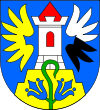Hrubá Skála
| Hrubá Skála | |||
|---|---|---|---|
| Municipality and village | |||
|
View to Hrubá Skála Castle, with Trosky Castle in the background | |||
| |||
| Coordinates: 50°32′45″N 15°12′20″E / 50.54583°N 15.20556°ECoordinates: 50°32′45″N 15°12′20″E / 50.54583°N 15.20556°E | |||
| Country |
| ||
| Region | Liberec Region | ||
| District | Semily District | ||
| Area | |||
| • Total | 5.34 sq mi (13.83 km2) | ||
| Elevation | 942 ft (287 m) | ||
| Population (2006) | |||
| • Total | 544 | ||
| Time zone | UTC+1 (CET) | ||
| • Summer (DST) | UTC+2 (CEST) | ||
| Postal code | 511 01 – 512 63 | ||
| Website |
hrubaskala | ||
Hrubá Skála (German: Groß Skal) is a village and municipality in Semily District of the Liberec Region in the Czech Republic.
Geography
It is located about 6 km (3.7 mi) southeast of Turnov within the Bohemian Paradise (Czech: Český ráj) landscape area. The adjacent sandstone 'rock town' (Hruboskalské skalní město), stretching to Trosky Castle, is a protected nature reserve since 1998 and a popular destination for climbers and hikers.
The municipal area comprises the cadastral communities of Hnanice pod Troskami and Hrubá Skála proper, with the villages of Bohuslav, Borek, Doubravice, Hnanice, Krčkovice, Rokytnice and Želejov.
History
_b_425.jpg)
Hrubá Skála Castle situated on a steep sandstone cliff was first mentioned in a 1353 deed, then a possession of the noble House of Waldstein (Valdštejn), ancestors of Albrecht von Wallenstein. The manor was called Hrubá Skála to differ it from nearby Malá Skála.
Held by the Lords of Smiřice from 1515 onwards, the rebuilt Renaissance castle had become the centre of one of the largest Bohemian estates with more than 50 villages. Seized by Emperor Ferdinand II upon the 1620 Battle of White Mountain, it was again held by the Waldstein dynasty from 1630 and devastated by both Saxon and Imperial troops during the Thirty Years' War. In 1821, Franz de Paula Adam von Waldstein sold Hrubá Skála to Johann Anton Lexa von Aehrenthal. In 1859 the castle was again rebuilt in a Neo-Gothic style.
After World War II the Aerenthal family was dispossessed and the German-speaking population expelled according to the Beneš decrees. Under Communist rule, the castle served as a recreation home, today it is run as a hotel.
Notable people
- Count Alois Lexa von Aehrenthal (1854–1912), Austro-Hungarian politician, born at Hrubá Skála Castle.
| Wikimedia Commons has media related to Hrubá Skála. |

